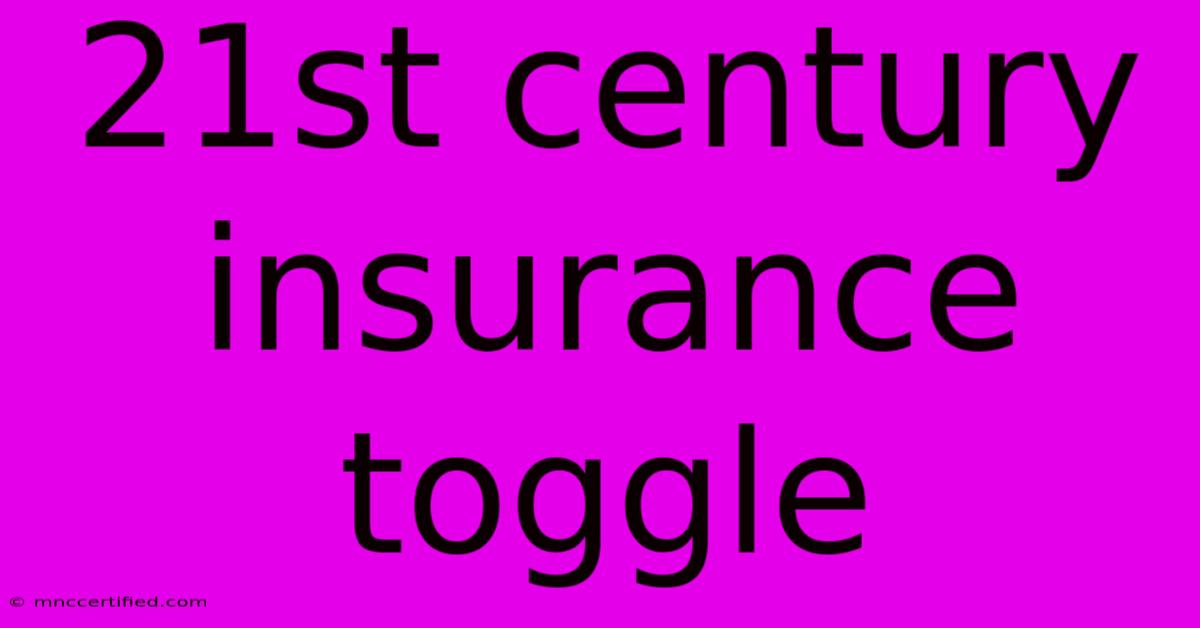21st Century Insurance Toggle

Table of Contents
21st Century Insurance: Navigating the Digital Toggle
The insurance landscape has undergone a seismic shift in the 21st century. Gone are the days of solely relying on in-person agents and paper-based processes. Today, technology acts as the central toggle, switching between traditional and innovative approaches to risk management and customer service. Understanding this digital transformation is crucial for both insurers and consumers alike. This article explores the key elements of 21st-century insurance, focusing on the impact of technology and its implications for the future.
The Rise of Insurtech: Disrupting the Status Quo
The term "Insurtech" encompasses the burgeoning field of technology-driven insurance solutions. These innovative companies are leveraging advancements in areas like artificial intelligence (AI), big data analytics, and blockchain technology to redefine the insurance experience. This disruption manifests in several key areas:
1. Personalized Pricing and Risk Assessment:
AI algorithms analyze vast datasets to create more accurate and personalized risk profiles. This leads to fairer premiums, as individuals are assessed based on their specific circumstances and behaviors rather than broad demographic categories. This is a key aspect of predictive analytics in insurance.
2. Automated Claims Processing:
AI-powered systems can automate many aspects of the claims process, from initial assessment to final settlement. This leads to faster payouts and improved customer satisfaction. Automated underwriting also streamlines the policy issuance process.
3. Enhanced Customer Engagement:
Insurtech companies often utilize mobile apps and online portals to provide customers with convenient access to their policies, claims information, and customer support. This digital-first approach prioritizes accessibility and user-friendly interfaces.
4. Blockchain for Transparency and Security:
Blockchain technology offers the potential for increased transparency and security in insurance transactions. It can streamline the process of verifying claims and managing policies, reducing fraud and improving efficiency. This aspect focuses on the security and trust aspects of digital insurance.
Traditional Insurance Adapting to the Digital Age
While Insurtech represents a significant challenge, traditional insurance companies are also adapting to the digital world. Many are investing in technology to improve their operations and customer service, offering online portals, mobile apps, and improved data analytics capabilities. This digital transformation within established insurers is crucial for their continued competitiveness.
Key Adaptations:
- Increased use of telematics: Tracking driving behavior through telematics devices allows for more personalized auto insurance rates.
- Development of digital ecosystems: Integrating with other platforms and services to offer holistic financial solutions.
- Investment in cybersecurity: Protecting sensitive customer data in the increasingly digital world is paramount.
The Future of Insurance: A Hybrid Model?
The future of insurance likely involves a hybrid model, integrating the strengths of both traditional and Insurtech approaches. Traditional insurers with their established infrastructure and expertise will need to incorporate innovative technologies, while Insurtech companies will need to navigate regulatory hurdles and build trust with consumers.
Keywords: 21st century insurance, Insurtech, AI in insurance, big data analytics, blockchain in insurance, digital transformation, personalized pricing, automated claims processing, predictive analytics, telematics, cybersecurity, insurance technology, digital insurance, future of insurance.
Off-Page SEO Strategies:
To further enhance the ranking of this article, consider the following off-page SEO strategies:
- Guest blogging: Contribute articles related to insurance technology to relevant blogs and websites.
- Social media marketing: Share the article on relevant social media platforms, engaging with users and building a community.
- Link building: Seek out opportunities to have other websites link back to your article.
- Forum participation: Engage in online forums and discussions related to insurance and technology, naturally incorporating links to your article where appropriate.
By implementing both on-page and off-page SEO strategies, you can significantly improve the visibility and ranking of your article on Google and other search engines, driving organic traffic and establishing your authority in the field of 21st-century insurance.

Thank you for visiting our website wich cover about 21st Century Insurance Toggle. We hope the information provided has been useful to you. Feel free to contact us if you have any questions or need further assistance. See you next time and dont miss to bookmark.
Featured Posts
-
Jump Trading Internship Salary
Nov 28, 2024
-
Fratton Park Blackout Match Abandoned
Nov 28, 2024
-
Your Spotify 2024 Wrapped Incoming
Nov 28, 2024
-
Liquid Gold Hair Bonding Glue
Nov 28, 2024
-
Vikings Sign Daniel Jones
Nov 28, 2024